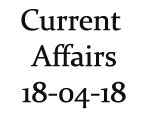-
Current Affairs 18th April 2018
Updated : 18-Apr-2018
Current Affairs 18th April 2018 - Important Points
- Elections to UN's NGO committee won by - India
- Union Environment Ministry notifies Plastic Waste Management (Amendment) Rules, 2018 on - 16th April 2018
- FAO designates 14 new sites as Globally Important Agricultural Heritage Systems on - 19th April 2018
- US Supreme Court restricts deportation of convicted immigrants on - 17th April 2018
-
SC stays NGT declaration of Amarnath shrine as ‘silence zone’ on - 16th April 2018
-
Union Environment Ministry releases the draft of National Clean Air Programme on - 17th April 2018
Current Affairs 18th April 2018 - Details
Elections to UN's NGO committee won by - India
Elecctions conducted by UN's non committee won by India on Non Governmental Organizations in the Asia Pacific States Category on 16th April 2018. India won these elections with highest number of votes - 46 followed by Pakistan (43), Bahrain (40) and China (39). As a rest India would be serving 4 years term in the committee starting from 1st January 2019.
Important Points
- In the elections, Ira received only 27 votes and lost the elections completely.
- Voting took place through secret ballot.
- For Asia Pacific States Category , ECOSOC elected India, Pakistan , Bahrain and China .
Union Environment Ministry notifies Plastic Waste Management (Amendment) Rules, 2018 on - 16th April 2018
The Union Environment Ministry advised the Plastic Waste Management (Amendment) Rules, 2018, on April 16th, 2018. According to the revised guidelines, the phasing out of Multi-layered Plastic will now be legal. The Multi-layered Plastic is non-recyclable, non-energy that could be recovered and has no alternative usage.
Plastic Waste Management (Amendment) Rules, 2018
- The revised guidelines suggested a central registration system for the registration of the manufacturer, importer or brand proprietor.
- The guidelines clarify that the registration processes should be automatic and should take into account comfort of doing business for manufacturers, recyclers and producers.
- The centralised registration system will be grown by Central Pollution Control Board for the recording of the manufacturer, importer or brand proprietor.
- Manufacturers with presence in over 2 states require to apply for national registry with the CPCB, while, minor manufacturers or brand proprietors operating within single or 2 states need a state-level registration with the SPCB.
- The Rule 15 of the Plastic Waste Management (Amendment) Rules, 2018 has been detached. This instruction explains the obvious pricing of the carry-bags.
FAO designates 14 new sites as Globally Important Agricultural Heritage Systems on - 19th April 2018
The UN's Food and Agriculture Organisation has selected fourteen sites as Globally Important Agricultural Heritage Systems. These sites will be formally revealed by the Food and Agriculture Organisation on April 19th, 2018. These fresh heritage locations belong to Asia, the Middle-East and Central America aeas and are situated in China, Egypt, Japan, South Korea, Mexico, Portugal, Sri Lanka and Spain.
These fourteen new locations range from oasis to rice terraces, wasabi farming to raisin production. These locations have shaped sceneries, art works and endangered sustainable ways of living and food production.
14 new Agricultural Heritage Sites- Siwa Oasis, Egypt in 2016.
- Chinampa Agriculture in the World Natural and Cultural Heritage Zone in Xochimilco, Tlahuac and Milpa Alta, Mexico-2017.
- Zhagana Agriculture- Forest-Animal Husbandry Composite System, China-2017.
- Huzhou Mulberry-dyke and Fish Pond System, China-2017.
- Osaki Kodo&'s Traditional Water Management System for Sustainable Paddy Agriculture, Japan-2017.
- Nishi-Awa Steep Slope Land Agriculture System, Japan-2017.
- Traditional Hadong Tea Agrosystem in Hwagae-myeon, Republic of Korea-2017.
- The Agricultural System of Valle Salado de Añana, Spain-2017.
- Malaga Raisin Production System in La Axarquía, Spain-2017.
- The Cascaded Tank-Village System, Sri Lanka-2017.
- Rice Terraces in Southern Mountainous and Hilly Areas, China-2018.
- Xiajin Yellow River Old Course Ancient Mulberry Grove System, China-2018.
- Traditional Wasabi Cultivation in Shizuoka, Japan-2018.
- Barroso Agro-sylvo- pastoral System, Portugal-2018.
Union Environment Ministry releases the draft of National Clean Air Programme on - 17th April 2018
The Union Ministry of Environment, Forest and Climate Change sanctioned the draft of the National Clean Air Programme on April 17th, 2018. The ministry has published the draft on their website and asked for comments from different shareholders by May 17th, 2018.
The National Clean Air Programme is a national action strategy that proposes numerous plans to reduce air pollution.
Highlights of the National Clean Air Programme- National Clean Air Programme focuses to enhance and progress an effective and a proficient network to monitor the ambient air quality around the nation for a inclusive and reliable database.
- The strategy calls for an efficient information distribution and public outreach process for within time actions to prevent and lessen air pollution.
- It also purposes to have a possible management plan for inhibition, control and reduction of air pollution.
NCAP details - The Ministry has comprehensive a host of measures to reduce air pollution under the National Clean Air Programme and few of these are:
1.Air quality monitoring network
2.Identification of alternate technology for real-time monitoring
3.Forming 10 city super network
4.Indoor-air pollution observing and management
5.Air pollution health effect observations
6.Air quality estimating system
7.Issuance of announcement on dust management
8. 3-tier process for evaluation, valuation and inspection for implementation of the plan
US Supreme Court restricts deportation of convicted immigrants on - 17th April 2018
The United States Supreme Court constrained deportation of immigrant offenders by ruling on April 17th, 2018 that the United States Immigration and Nationality Act demanding the deportation of immigrants sentenced of certain violence crimes is unconstitutionally ambiguous.
The court cancelled the provision in a 5-4 ruling. The ruling came on an application filed by sentenced California burglar James Garcia Dimaya, who is a lawful immigrant from the Philippines.
Key Highlights- The United states SC supported a 2015 lower court ruling that the provision demanding Dimaya’s deportation formed doubt over which crimes may be measured violent, risking uninformed enforcement in destruction of the US Constitution.
- The Supreme court’s ruling will not affect various serious crimes, consisting murder, rape, terrorism offenses which are precisely enlisted in the law as bases for deportation.
- Hence, this could bound the impact of the ruling even though the government does not gave information on which crimes cause the most number of deportations.
- The Supreme court’s ruling comes at a time when there is a strong focus on immigration questions in the USA, as Donald Trump looks forward to rise deportations of criminal immigrants.
SC stays NGT declaration of Amarnath shrine as ‘silence zone’ on - 16th April 2018
The India Supreme Court crashed down the order of the National Green Tribunal that had announced the Amarnath cave shrine as a ‘silence zone’ and banned religious offerings including chanting of hymns and ringing bells outside the entry point on April 16th, 2018.
A 2-judge bench including Justice Madan B Lokur and Justice Deepak Gupta remained the National Green Tribunal command while hearing a application filed by the Amarnath Shrine Board against the instruction on the bases that a conclusion in a case could not be grounded outside the pleading of the parties.
The Amarnath Shrine Board had confronted the National Green Tribunal order in the Supreme court,
disagreeing that the green tribunal cannot give orders on the Amarnath shrine related to ban the use of horses and ponies in Vaishno Devi shrine premises in Jammu.
The judges’ bench specified that the NGT had surpassed its jurisdiction in giving the order.
The Amarnath cave temple, located in the Himalayas in the J&K state, is measured as one of the most holy places for Hindus. The cave is shielded with snow during most of the year except a short time period in summer when it is unlocked for pilgrims.Did you know?
The NGT had on December 13th, 2017 announced the Amarnath cave shrine as a ‘silence zone’ and banned religious offerings like hymns chanting and ringing bells outside the entry point. The action was an effort intended at preserving the shrine and its ecosystem, indirectly avoiding avalanches and maintaining its untouched nature.
The tribunal also acknowledged that nobody would be allowed to bring anything from the stairs and everyone should be checked properly at the entry point.
It also announced the iron grills elimination presented in front of the Shiva Linga in order to permit the pilgrims a better view of the structure. The tribunal also restricted pilgrims from taking any personal belonging including mobile phones beyond the last barrier and instructed the shrine board to build some place for keeping the valuables of the devotees.














